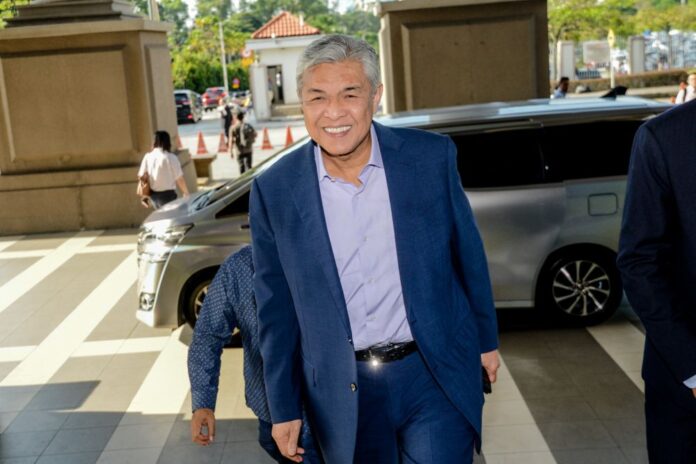.jpg)
Subscribe to our Telegram channel for the latest updates on news you need to know.
KUALA LUMPUR, March 4 — A five-year contract for the supply of 12.5 million chips for Malaysian passports would not have been awarded in 2015 to Datasonic Technologies Sdn Bhd if then home minister Datuk Seri Ahmad Zahid Hamidi had not approved the project’s award, the High Court heard today.
Malaysian Anti-Corruption Commission (MACC) investigator Mohd Hizar Farhan Abdul Razi said this while testifying as the 91st prosecution witness in Zahid’s criminal trial here.
While being cross-examined by Zahid’s lawyer Datuk Ahmad Zaidi Zainal, the MACC officer said the passport chips contract was under the Home Ministry’s purview, but agreed that it is for the Finance Ministry to decide whether to allow government contracts to be awarded through direct negotiations instead of open tender.
Zaidi suggested that it was common for projects involving national security such as passports to be awarded through direct negotiations, but Mohd Hizar Farhan said he was uncertain about this.
Mohd Hizar Farhan agreed that the entire process for the passport chips contract’s award, including the Finance Ministry’s approval for the Home Ministry to start direct negotiations with Datasonic Technologies, had complied with the necessary procedures and standard processes.
During re-examination by deputy public prosecutor Gan Peng Kun, the MACC officer said the award of the passport chips project to Datasonic Technologies had followed procedure, as an application was made to the Finance Ministry for direct negotiations, with the ministry then directing the Home Ministry to continue with the appointment of the contractor for the project.
Mohd Hizar Farhan said that the contract was awarded through direct negotiations as Datasonic Technologies was the only company involved, and as no other companies were asked to join in negotiations.
Gan then asked Mohd Hizar Farhan to explain why he had agreed that the awarding of the project had complied with the standard operating procedures fixed by the Finance Ministry.
Gan: If the accused (Zahid) did not agree for this project to be awarded to Datasonic, will the Finance Ministry agree for the project to be given to Datasonic?
Mohd Hizar Farhan: No.
Zaidi then asked why Mohd Hizar Farhan had said that the Finance Ministry would not have awarded the contract if Zahid did not agree with such an award.
“Because Datuk Seri Zahid is the minister for the Home Ministry at that time,” Mohd Hizar Farhan replied, confirming that this was his only reason.
In this trial, Zahid ― who is a former deputy prime minister and currently the Umno president ― is facing 47 charges, namely 12 counts of criminal breach of trust in relation to charitable foundation Yayasan Akalbudi’s funds, 27 counts of money laundering, and eight counts of bribery charges.
Among other things, Zahid was accused in this trial of having received RM6 million in bribes via two cheques as a reward for the appointment of Datasonic Technologies via direct negotiation for a five-year contract to supply 12.5 million passport chips.
In December 2015, the contract was awarded to Datasonic Technologies to supply the 12.5 million passport chips for a five-year period from December 1, 2016 to November 30, 2021.
Datasonic Group Berhad deputy managing director Chew Ben Ben had as the 34th prosecution witness previously told the court that he had personally handed over two cheques totalling RM6 million to Zahid following a meeting in April 2017 at the deputy prime minister’s official residence at Seri Satria.
Chew had, however, also asserted in court that the RM6 million cheques in 2017 was a political donation to Barisan Nasional through Zahid that had nothing to do with the award of the project to Datasonic Technologies in 2015, also explaining his view that political funds include corporate social responsibility and charity funds.
The trial before High Court judge Collin Lawrence Sequerah resumes tomorrow morning.



